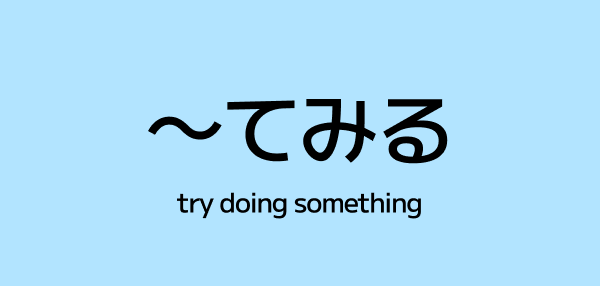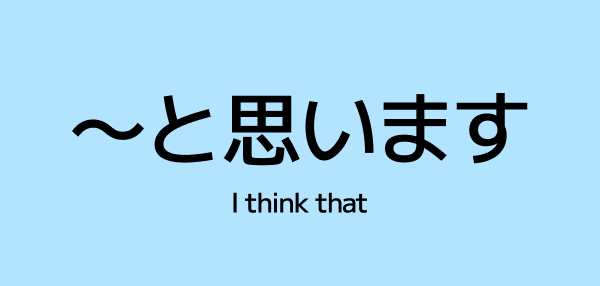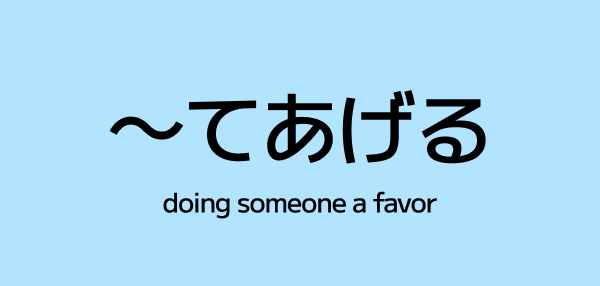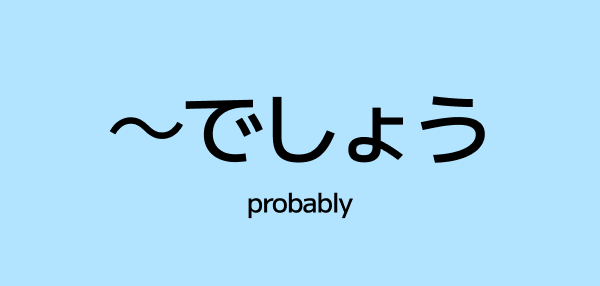~ようと思う (you to omou) – Thinking of Doing Something in Japanese
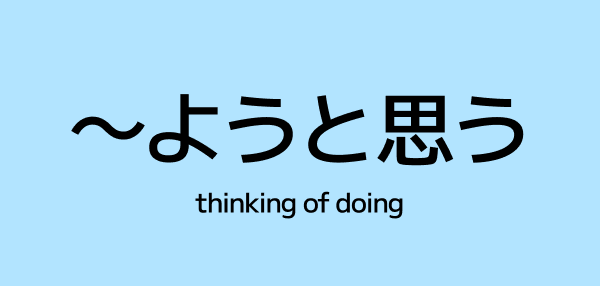
Want to say "I'm thinking of studying abroad" or "I thought I'd try cooking"? When you're considering doing something or have tentatively decided on an action, ~よう と思う is the perfect pattern to use.
This grammar expresses intentions that are slightly less firm than ~つもり. It shows you're thinking about doing something or have just decided to do it. Let's see how it works!
What Does ~よう と思う Mean?
~ようと思う means "I'm thinking of doing" or "I think I'll do."
It combines:
- The volitional form (~よう) meaning "let's / will"
- と = quotation particle
- 思う = to think
Literally, it means "I think 'I will do [this].'"
This pattern expresses:
- Tentative intentions or plans you're considering
- Recent decisions you've just made
- Softer statements about future actions (less definite than ~つもり)
The key difference from ~つもり:~ようと思う sounds like you're still thinking about it or have just decided, while ~つもり sounds like a firm, established plan.
How to Use ~ようと思う
The structure uses the volitional form of verbs:
Verb (volitional form) + と思う / 思います
To make it polite, use 思います.
Here's how to form the volitional (~よう / ~おう) for different verb types:
Godan Verbs (う-verbs):
- いく (go) → いこう → いこうと思う
- かう (buy) → かおう → かおうと思う
- はなす (speak) → はなそう → はなそうと思う
- よむ (read) → よもう → よもうと思う
- のむ (drink) → のもう → のもうと思う
Ichidan Verbs (る-verbs):
- たべる (eat) → たべよう → たべようと思う
- みる (see) → みよう → みようと思う
- ねる (sleep) → ねよう → ねようと思う
Irregular Verbs:
- する (do) → しよう → しようと思う
- くる (come) → こよう → こようと思う
Example Sentences
- 🎓 来年留学しようと思います。 I'm thinking of studying abroad next year.
- 🏃 明日からジムに行こうと思っています。 I'm thinking of going to the gym starting tomorrow.
- 📚 日本語をもっと勉強しようと思います。 I'm thinking of studying Japanese more.
- 🍱 今日は自分で料理しようと思います。 I think I'll cook for myself today.
- 💇髪 を切ろうと思っています。 I'm thinking of cutting my hair.
- 🚭 タバコをやめようと思います。 I'm thinking of quitting smoking.
- 📱 新しいスマホを買おうと思います。 I'm thinking of buying a new smartphone.
~よう と思う vs. ~ようと思っている
There's a subtle difference:
~ようと思う (思います):
- Just decided / making the decision now
- Example: 明日行こうと思います。(I think I'll go tomorrow.) ← deciding now
~ようと思っている (思っています):
- Already decided / been thinking about it
- Example: 明日行こうと思っています。(I'm planning to go tomorrow.) ← already decided
Compare:
- 💡 ダイエットしようと思います。 I think I'll go on a diet. (just decided! Freshly top of mind.)
- 💡 ダイエットしようと思っています。 I'm thinking of going on a diet. (been considering it)
The ~ている form suggests the thought or decision has been ongoing or established.
Past Tense: "I Thought I'd..." / "I Was Thinking Of..."
Use ~よう と思った (past) to express what you thought or intended to do:
Verb (volitional) + と思った / 思いました
Examples:
- 🌧️ 出かけようと思ったけど、雨が降った。 I thought I'd go out, but it rained.
- 📖 本を読もうと思いました。 I thought I'd read a book.
- 💬 電話しようと思ったのに、忙しくてできなかった。 I was thinking of calling, but I was too busy and couldn't.
- 🍜 ラーメンを食べようと思って、店に行きました。 I thought I'd eat ramen, so I went to the shop.
This pattern often appears with けど (but), のに (even though), or て-form to show the thought process behind an action or explain why something didn't happen.
Negative Form: "I'm Not Planning To..." / "I Don't Think I'll..."
For negative intentions, you have two main options:
Option 1: Negative volitional (~まい) + と思う This is formal and less common in modern Japanese.
Option 2: [Verb (ない-form)] + と思う More natural and common:
Examples:
- 🚫 今日は出かけないと思います。 I don't think I'll go out today.
- 🚫 あまり食べないと思います。 I don't think I'll eat much.
- 🚫 彼に会わないと思います。 I don't think I'll meet him.
Note: This sounds more like a prediction ("I don't think I will") rather than a firm intention ("I'm not planning to"). For firm negative intentions, ~つもりはない is clearer.
Asking About Someone's Thoughts/Plans
To ask someone about their thinking or plans:
[Verb (volitional)] + と思いますか? → Are you thinking of [verb]ing? / Do you think you'll [verb]?
Example conversations:
👤 今年旅行しようと思いますか? Are you thinking of traveling this year?
👤 はい、行こうと思っています。 Yes, I'm thinking of going.
👤 パーティー に来ようと思う? Are you thinking of coming to the party? (casual)
👤 うん、行こうと思ってる。 Yeah, I'm thinking of going. (casual)
👤 大学院に進学しようと思っていますか? Are you thinking of going to graduate school?
👤 まだわかりませんが、考えています。 I'm not sure yet, but I'm considering it.
~つもり vs. ~ようと思う: What's the Difference?
Both express future intentions, but the nuance is different:
~つもり:
- Firm, established plan or intention
- Decided and committed
- Example: 来年日本に行くつもりです。(I plan to go to Japan next year.) ← definite plan
~ようと思う:
- Tentative thought or recent decision
- Still considering or just decided
- Example: 来年日本に行こうと思います。(I'm thinking of going to Japan next year.) ← considering it
Compare these:
- 💼 会社を辞めるつもりです。 I intend to quit the company. (firm decision)
- 💼 会社を辞めようと思っています。 I'm thinking of quitting the company. (considering it)
Use ~つもり when you want to sound more definite, and ~ようと思う when you want to sound more tentative about your plans.
Cultural Note: Softening Your Statements
In Japanese communication, sounding too direct or certain can sometimes feel pushy or arrogant. ~よう と思う is a great way to:
- Soften your statements about future actions
- Show humility by not being too assertive
- Invite feedback by presenting plans as "thoughts" rather than fixed decisions
This is especially useful in:
- Professional settings: When proposing ideas or plans (but not being too committal)
- Social situations: When suggesting what you might do and get some feedback
- Polite conversation: When you don't want to sound too forceful
For example, in a meeting:
- このプロジェクトを進めようといますが、皆さんのご意見をお聞かせください。 (I'm thinking of proceeding with this project, but I'd like to hear everyone's opinions.)
This sounds much softer than:
- このプロジェクトを進めるつもりです。 (I intend to proceed with this project.) ← More forceful, doesn't invite much feedback
Common Patterns with ~よう と思う
~ようと思って → thinking of doing [X], so... (explains reasoning)
- Example: 運動しようと思って、ジムに入りました。 Thinking of exercising, I joined a gym.
~ようと思ったら → when I thought I'd... / if I think I'll...
- Example: 出かけようと思ったら、雨が降ってきた。 When I thought I'd go out, it started raining.
~ようと思ったけど → I thought I'd..., but...
- Example: 早く寝ようと思ったけど、ドラマを見てしまった。 I thought I'd sleep early, but I ended up watching a drama.
Try It Yourself!
How would you say these in Japanese using ~よう と思う?
- "I'm thinking of buying a new computer."
- "I thought I'd study, but I was too tired."
- "Are you thinking of going to the party?"
✅ Answers:
- 新しいパソコンを買おうと思います。
- 勉強しようと思ったけど、疲れすぎました。
- パーティー に行こうと思いますか?
Key Takeaways
- ~ようと思う = "I'm thinking of doing" or "I think I'll do"
- Structure: Verb (volitional form) + と思う / 思います
- Softer and more tentative than ~つもり
- ~ようと思っている = already been thinking about it (ongoing consideration)
- Past: ~ようと思った = I thought I'd... / I was thinking of...
- Shows humility and invites feedback in Japanese communication
- Different from ~つもり: less firm, more like "considering" vs. "planning"
Expressing your thoughts and considerations naturally helps you connect with others — and ~よう と思う is your polite, humble way to share what you're thinking of doing! 💭
Related Grammar
Build Your Japanese Foundation
Keep your momentum going with bite-sized guides for the core writing systems.
Learn Hiragana(ひらがな)
Master the basic script for native Japanese words, particles, and verb endings so grammar patterns click faster.
Go to Hiragana Guide →Learn Katakana(カタカナ)
Get comfortable reading foreign words, brand names, and emphasis so you can recognize more vocabulary everywhere.
Go to Katakana Guide →Save Grammar & Vocabulary with Bento Japanese
Create a free account to get weekly reads, save vocabulary to your Collections, and track your progress.

